Related Research Articles

In Spain, music has a long history. It has played an important role in the development of Western music, and has greatly influenced Latin American music. Spanish music is often associated with traditional styles such as flamenco and classical guitar. While these forms of music are common, there are many different traditional musical and dance styles across the regions. For example, music from the north-west regions is heavily reliant on bagpipes, the jota is widespread in the centre and north of the country, and flamenco originated in the south. Spanish music played a notable part in the early developments of western classical music, from the 15th through the early 17th century. The breadth of musical innovation can be seen in composers like Tomás Luis de Victoria, styles like the zarzuela of Spanish opera, the ballet of Manuel de Falla, and the classical guitar music of Francisco Tárrega. Nowadays commercial pop music dominates.

Valencian or Valencian language is the official, historical and traditional name used in the Valencian Community of Spain to refer to the Romance language also known as Catalan, either as a whole or in its Valencia-specific linguistic forms. The Valencian Community's 1982 Statute of Autonomy and the Spanish Constitution officially recognise Valencian as the name of the regional language.

The Catalan Countries are those territories where the Catalan language is spoken. They include the Spanish regions of Catalonia, the Balearic Islands, Valencian Community, and parts of Aragon and Murcia (Carche), as well as the Principality of Andorra, the department of Pyrénées-Orientales in France, and the city of Alghero in Sardinia (Italy). It is often used as a sociololinguistic term to describe the cultural-linguistic area where Catalan is spoken. In the context of Catalan nationalism, the term is sometimes used in a more restricted way to refer to just Catalonia, Valencia and the Balearic Islands. The Catalan Countries do not correspond to any present or past political or administrative unit, though most of the area belonged to the Crown of Aragon in the Middle Ages. Parts of Valencia (Spanish) and Catalonia (Occitan) are not Catalan-speaking.

The music of Catalonia comprises one of the oldest documented musical traditions in Europe. In tandem with the rest of Western Europe, it has a long musical tradition, incorporating a number of different styles and genres over the past two thousand years.

The Muixeranga ( ) is the collective name given to the performance of ancient street dances and human pyramids or castells, originating in the ancient Kingdom of Valencia, which are still preserved in the town of Algemesí, 30 km (19 mi) southwest from Valencia, and certain other Valencian towns.
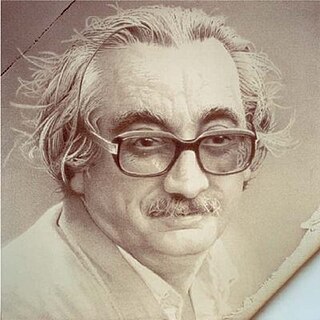
Joan Fuster i Ortells was an influential Spanish writer. He is considered a major writer in the Valencian language, and his work contributed to reinvigorate left-wing, pro-Catalan nationalism in Valencia during the Spanish transition to democracy. In his influential political essay Nosaltres, els valencians (1962) he coined the term Països Catalans to refer to the Catalan-speaking territories.

Correfocs ; literally in English "fire-runs") are among the most striking features present in Valencian and Catalan festivals. In the correfoc, a group of individuals will dress as devils and light up fireworks – fixed on devil's pitchforks or strung above the route. Dancing to the sound of a rhythmic drum group, they set off their fireworks among crowds of spectators. The spectators that participate dress to protect themselves against small burns and attempt to get as close as possible to the devils, running with the fire. Other spectators will watch from "safe" distances, rapidly retreating as necessary.

Obrint Pas was a band from Valencia, in the Valencian Community. Their music is a mixture of rock, ska, reggae, hardcore punk, and folk. Their songs include traditional instruments—including the Valencian dolçaina—and melodies. Their lyrics often contain themes of protest, solidarity, the territorial unity and independence of the Catalan Countries, promotion of the Catalan language, and the revindication of Valencian culture and traditions. They also consider antifascism and antiracism. Their lyrics, melodies, and political coherence influenced the first generation born after the death of Francisco Franco: the first generation with access to education in the Valencian language.

Arroz a la valenciana or Valencian rice is a name for a multitude of rice dishes from diverse cuisines of the world, which originate from the rice-cooking tradition of the Valencian Community, in eastern Spain.
The names of the Valencian Community are diverse, even though Comunitat Valenciana is the only denomination with official status in its Statute of Autonomy. Nonetheless, this legal document includes in its Preamble other legal denominations that portray the history and nature of the territory: Regne de València and País Valencià.
Blaverism is a Valencian regionalist ideology in the Valencian Community (Spain) that emerged with the Spanish transition to democracy characterised by strong anti-Catalanism, born out of its opposition to Joan Fuster's book Nosaltres, els valencians (1962), which promoted the concept of the Catalan Countries which includes Valencia. They consider Fuster's ideas as an imperialist Catalan nationalist movement that tries to impose Catalan domination upon Valencia.
Valencian nationalism or Valencianism is a political movement in the Valencian Community, Spain.
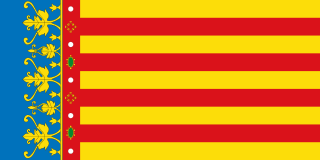
The Valencian Community is an autonomous community of Spain. It is the fourth most populous Spanish autonomous community after Andalusia, Catalonia and the Community of Madrid with more than five million inhabitants. Its homonymous capital Valencia is the third largest city and metropolitan area in Spain. It is located along the Mediterranean coast on the east side of the Iberian Peninsula. It borders Catalonia to the north, Aragon and Castilla–La Mancha to the west, and Murcia to the south, and the Balearic Islands are to its east. The Valencian Community is divided into three provinces: Castellón, Valencia and Alicante.

Manel is an indie pop band from Barcelona who sing in Catalan. They released their first album in 2008. They describe their musical style as a synthesis of pop and folk music. Critics have linked their style to that of other Catalan-speaking musicians such as Pau Riba, Jaume Sisa, and Antònia Font.

The Festivity of La Mare de Déu de la Salut is a festival celebrated in Algemesí (Valencia), Spain, from August 29 to September 8. The festival is in honour of the patron saint of Algemesí, La Mare de Déu de la Salut, and has been dated back to 1247. The holiday was awarded the UNESCO "Masterpieces of the Oral and Intangible Heritage of Humanity" designation on November 28, 2011.
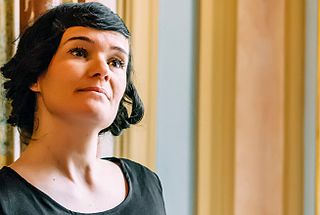
Mara Aranda is a Spanish singer. She is known for rediscovering and reviving the musical heritage of Sephardic Jews.

Joan Francesc Mira i Casterà is a Spanish writer, anthropologist and sociologist. He is an honorary member of the Associació d'Escriptors en Llengua Catalana and President of Acció Cultural del País Valencià. In politics he is a supporter and has been a candidate of Valencian Nationalist Bloc in 2000 and 2003.
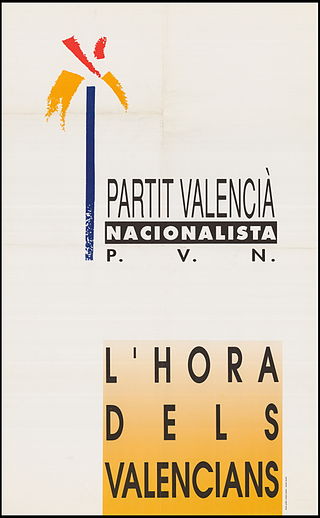
The Nationalist Valencian Party was a political party created in 1990 as an offshoot of the Valencian People's Union.
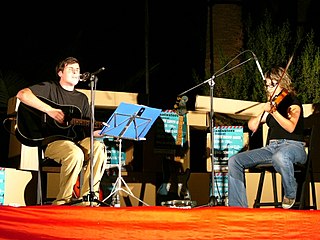
Pau Alabajos i Ferrer is a spanish singer-songwriter and politician. As of 2017 he has seven records under his belt. He is the current Secretary of the musicians and singers association in the Valencian Country Col•lectiu Ovidi Montllor (COM).

María Teresa Oller was a Spanish composer and folklorist of the Valencian Community. Since the 1950s, she carried out extensive fieldwork to collect traditional Valencian music, highlight it, and make it known in numerous publications. Oller was a member of the Real Academia de Bellas Artes de San Carlos de Valencia.
References
- 1 2 3 4 5 6 "música del País Valencià". www.enciclopedia.cat. Retrieved 2024-02-21.
- ↑ Palací, David Javaloyes i (2018-11-25). "Els valencians també fem coses (I): la tradició musical al País Valencià". Mirall (in Catalan). Retrieved 2024-02-21.
- ↑ Xambó, Rafa. «La feraç i ferotge música del País Valencià». Revista del Centre de Lectura de Reus, 2022, https://raco.cat/index.php/RevistaCLR/article/view/401165.
